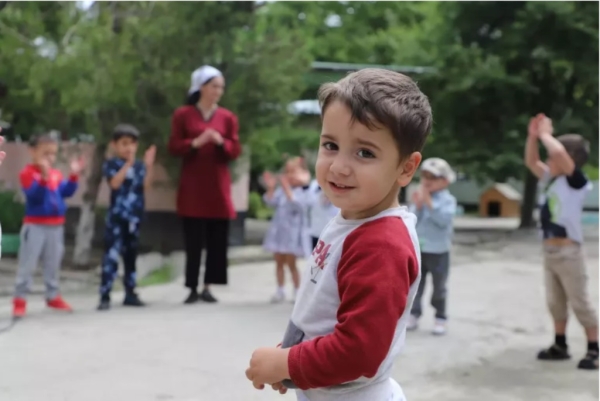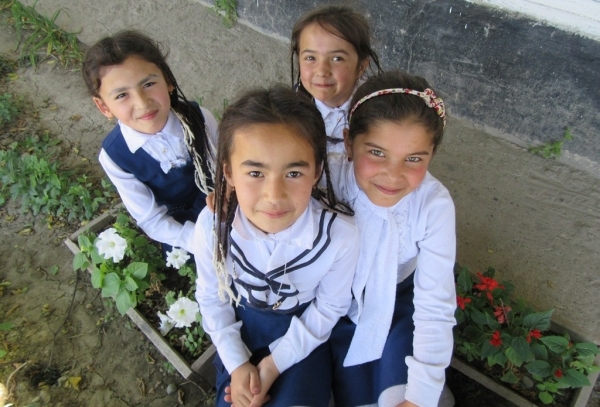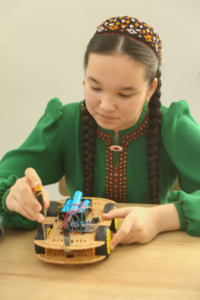
Photo: UNICEF
Tajikistan has achieved a complete ban on corporal punishment of children with the adoption of the Law of the Republic of Tajikistan “On Responsibility for Education and Upbringing of Children” as amended in 2024 (the former Law “On Responsibility of Parents for the upbringing of children” was adopted in 2011). The new Law was adopted on June 20, 2024 and entered into force immediately.
Thanks to this legislative reform, Tajikistan has become the 67th State in the world to implement the rights of children to protection from all types of cruel punishment.
The new law protects about 4 million children in the country from any form of forced parenting, whether at home or at school, UNICEF representative in Tajikistan Arthur van Diesen said in a statement.
“This step was a significant breakthrough in the protection of children's rights and demonstrates the strong commitment of the Government of Tajikistan to ensuring the safety and dignity of every child. The legislation not only prohibits corporal punishment in all conditions, but also establishes mechanisms that allow children to receive protection from violence, regardless of their age,” – the statement said.
At the same time, Arthur van Diesen stressed that there is still a lot of work to be done in order for these measures to lead to positive changes in the life of every child.
“Child abuse remains a global problem affecting about 330 million children worldwide. It causes serious damage to their health and development, can disrupt the functioning of the brain and nervous system, and lead to long-term difficulties in behavior and mental health. In the long term, violence is associated with an increased risk of mental illness, chronic health problems, impaired cognitive and emotional development, as well as decreased academic performance,” – van Diesen believes.
The statement emphasizes that the economic costs of child abuse are estimated at $7 trillion per year, which is approximately 8% of global GDP.
The report notes that although the legislation itself is not able to fully protect children, bans on corporal punishment are an important first step. They raise awareness of the negative consequences of such violence and send a clear message to society about the inadmissibility of causing pain to children. In countries such as Romania, Kenya, Japan and Germany, the use of corporal punishment has decreased significantly since the introduction of similar bans.
All countries that have signed the Convention on the Rights of the Child and adopted the Sustainable Development Goals, including Tajikistan, have committed to ending violence against children. The goals call for an end to all forms of abuse and violence by 2030.

Photo: UNICEF
New legislation
Article 4 lists the principles on which responsibility for the education and upbringing of children is based, including respect for the child, his rights and freedoms, ensuring the protection of the legitimate rights and interests of the child, and preventing violence against children.
Article 16 of the Law of the Republic of Tajikistan “On responsibility for the education and upbringing of children” obliges parents not to use violence, including corporal punishment, against a child in the process of upbringing, respect the dignity of the child, and prevent cruel, inhuman and degrading treatment.
Article 17 establishes that persons replacing parents have all the rights and obligations provided for by articles 14, 15 and 16 of this Law for parents, unless otherwise established by the legislation of the Republic of Tajikistan.
Article 20 confirms the prohibition of corporal punishment in schools and other institutions, requiring teachers not to use violence, including corporal punishment, against children in the learning process, to respect the child and respect the rights, freedoms and dignity of the child, to prevent cruel, inhuman and degrading treatment.
Article 21 obliges the relevant authorities to take measures to prevent offenses in the field of education and upbringing of children: to implement a set of measures of an economic, social, legal, informational, educational, educational and rehabilitative nature to prevent offenses on the part of parents, guardians, trustees, persons raising children under a contract, other legal representatives, as well as other individuals and legal entities under whose custody and upbringing the child is, as well as to eliminate the causes and conditions that contribute to them, in accordance with the legislation of the Republic of Tajikistan.
Article 22 sets out preventive measures that can be taken to assist parents, including conducting explanatory work among the population, holding meetings with parents, organizing a “Parent's Day” in educational institutions, as well as material and moral encouragement for parents who successfully fulfill their duties in teaching and raising children, conducting preventive conversations, providing individual support to parents.




